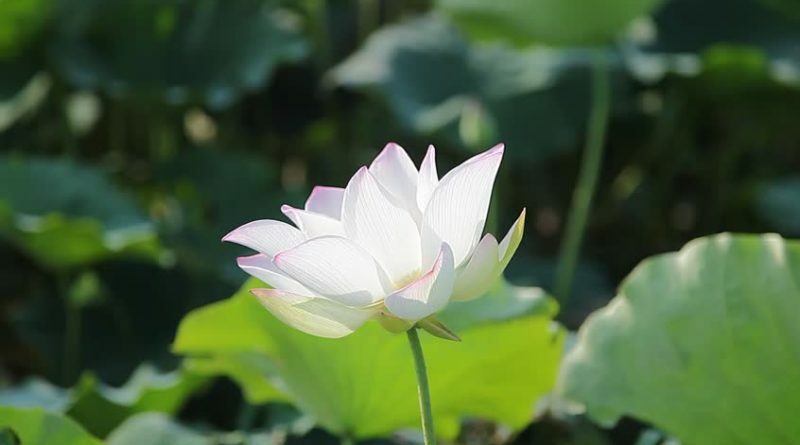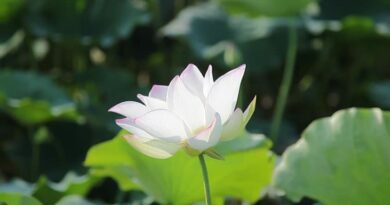STEPPING BACK
Stepping Back
When you meditate, it’s easy to get frustrated. Here you are, looking at the breath, and as Ajaan Lee says, “Just four concentrations, and you can’t master them.” The mind keeps slipping off, and no matter how determined you are to stay with the breath, you find yourself someplace else. Often it doesn’t seem like the meditation’s heading in any particular direction — just kind of mucking around — and you wonder, “What does this have to do with the Deathless? What does this have to do with true happiness?” That’s when it’s time to step back and look at the larger perspective.
The big issue of course is your mind. No matter where you live, no matter where you go, you’ve got the mind right there. If you can’t keep it under any kind of control at all, you’re living with something very dangerous because all kinds of things can happen to it. A slight chemical imbalance in the body and the mind gets really depressed. It can’t seem to pull itself out of the depression. Or it starts hallucinating. There are all sorts of things the mind can do, all kinds of things the brain can do.
It’s important to keep a distinction between the mind and the brain. The brain is the physical organ, while the part of the mind we’re interested in is just basic awareness. We use the organ to think, but if the organ is damaged in any way, out of balance in any way, then our thoughts become our enemies. And what are you going to do then? If you have enough mindfulness to pull yourself out of your thought worlds, you’re safe. If you have enough mindfulness to pull yourself out of anything the mind does, you’re safe.
We talk about the mind clinging, the mind hanging on to things, but it doesn’t have hands to cling. When it “clings to something” it just keeps thinking about it over and over and over again, it keeps wanting it over and over and over again. To let go of the clinging means that you just let it stop. And the only way you can let it stop is to get out of it and see it simply as an event in the mind.
The last time I went to visit with Ajaan Suwat before he passed away, he commented that his brain was sending him all sorts of weird messages, and he’d learned that he had to put a question mark after everything that came into his mind. “But,” he said, “that thing I gained from the practice: That hasn’t gone away.” That thing was what enabled him to pull out of those messages in order to see that they were strange, weird messages, and that he didn’t have to believe them. He had a foundation, so even as the brain was churning out weird perceptions, he had access to a dimension where he didn’t have to get involved.
As we meditate, we’re working in the direction of that dimension. The first step is to establish a safe place through concentration to keep our awareness based, a place where it’s protected. And that’s worth all kinds of effort, all kinds of discouragement, all the things we have to go through in order to get there, because the real sense of solidity and safety that comes with that is more than you can imagine. You realize how long you’ve been wandering around, misled by your thoughts, and how totally deluded you were, and how much suffering it caused. Then when you can step out — really step out, even out of that base of concentration — an enormous burden is lifted. In its place you gain both a sense of the solidity of that new dimension, and the confidence that nothing can touch it because it’s outside of space and time. As for what’s going to happen inside of space and time, that’s a matter of karma. Even awakened people have to age, grow ill, and die, but they’ve found the dimension that doesn’t age, doesn’t grow ill, doesn’t die.
And how did they find it? By doing what we’re doing right now. Every time a thought comes up, here’s your chance: Are you going to fall for the thought or are you going to step back from it? The thoughts may be crazy, they may be things you don’t want to think about, but as long as you’re able to step back from them, you’re in a good position. This place where you’re stepping back may not be as totally solid as you’d like it, but it’s heading you in the right direction. If you don’t have this, you have no safety at all. There’s no protection, no perspective, at all. Without the perspective there’s no wisdom, no insight. And without insight, you’re totally immersed in delusion.
What is it like to be totally deluded? You’re totally unsure of things. Deep down inside, things don’t seem quite right, and there’s always an element of fear. As the Buddha said, “As long as you’re uncertain about the true Dhamma, there’s always the fear of death.” What’s going to happen when you die? The only way you can know is by looking at the processes of the mind, because it’s already going through death and birth on a small level all the time. It just keeps coming back, coming back, coming back. Whatever habitual patterns you’ve been encouraging in the mind, they just keep coming back again and again and again. But the fortunate thing is that you can step out of them.
This is what the Buddha’s teachings on karma are all about. Not everything is pre-determined in the mind. With every present moment, there’s always the opportunity to make a new decision, to make a new choice, but most of us abandon that freedom and just keep flowing along with the same old patterns over and over and over again. We need to learn to appreciate our ability to step back and get some perspective, to pull ourselves out of our thought worlds. No matter how fleeting your stepping out may seem as you’re practicing, each time you do it you’re strengthening the skillful habit in the mind, the habit that’s actually your path.
Ajaan Maha Boowa tells of how when Ajaan Mun passed away, he was really hit with a sense of despair: What was he going to do with his life now? When issues came up in his meditation, to whom would he go for help? He said he felt like someone who’d been depending on a doctor for long years and now the doctor was gone. It was like being a wild animal in the forest with no doctor at all. But then he remembered all the teachings he’d gotten from Ajaan Mun in the past. Those would have to be his teachers now. And what was the point that Ajaan Mun emphasized more than anything else? “Whenever anything comes up in your mind that you’re not sure about, just step back and stay with that sense of the knower, that sense of just basic awareness, and no matter what, whatever it is in the mind will pass and you’ll be safe.” It seems like such a little thing, just the sense of the watcher, the observer, but it can keep you safe, because it’s the faculty of the mind that can pull you out.
Even when storms are blowing through the mind, you’re in a safe spot. You’ve got your haven right here. Just don’t let yourself get pulled into the storms, because they can blow you all over the place. The Buddha once said, “Look at the animal world. See how variegated it is — all those many, many, many kinds of animals, all the different shapes they take, all the different ways they live.” Then he added, “The mind is more variegated than that.” It can get itself into all kinds of fixes. But you’ve also got your protection right here. It’s right close to hand. It’s closer than your eyes. The point in meditation is to learn how to appreciate it, how to value it. Even though it may seem unstable right now, keep coming back, coming back, coming back. If you don’t, what lies in store? You get blown around in the whirlwind, like the shades in Dante’s Inferno. If you do step back, though, you find that you’re strengthening a very important habit. Each time you remember to come back builds a pathway in the mind.
When you come to meditate in a place like this, it’s as if you’ve got your nose above water, you’ve pulled yourself out a little bit from the flood. That’s what they call it — “the flood”: all these things that come pouring out of the mind. If you’re not careful, they can totally immerse you. You can drown. But here you’ve got your nose above water. You can breathe. It may not yet be the most stable position, but the Buddha says that it can become your island.
You’ve got your island in the midst of the flood here. It may not be a big island, but it’s big enough. As you develop it, it opens up to even better things in the mind.
Without this sense of awareness, what would you have? Nothing. Nothing to hold onto at all. You’d be swept around in the storms that the mind cooks up. With this, though, you have hope — and it’s not a far-off hope. It’s something right here. If you learn how to value it, it’ll open up and show you all it has to offer — more than you can imagine. It’s like one of those fairy tales where there’s the ugly little troll under the bridge who, as it turns out, has gold stashed away. The valuable things in life are often in the places where you’d least expect to find them, and they’re closer to home than you might think.
So keep this in mind. You’ve got gold right here, but it’s covered up by dust and dirt, and the dust and the dirt can be cleared away. Aside from this gold, you have nothing. With the gold you have no more needs.



